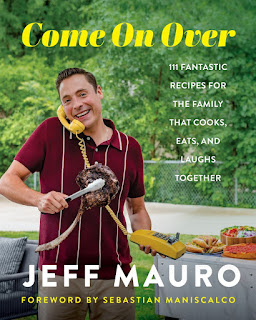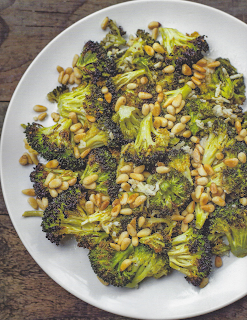Weekend Cooking: Come On Over by Jeff Mauro

As you can tell from the title, this cookbook is all about entertaining—but don’t think hoity-toity. The gatherings Mauro likes are those that involve family and close friends. Each chapter focuses on a different kind of company meal, such as brunch, game day, cook-out, and pizza. There are also menus for themed meals, like tropical, Mexican, and holiday.
The recipes themselves are fairly easy to put together and have good flavor. We liked the Crispy Broccoli with Asiago and Pine Nuts, for example (see scan), which consists of tossing the broccoli in seasonings and cheese, roasting it, and then mixing with toasted pine nuts and some lemon zest and juice. Simple and delicious.
We (by we I, of course, mean me!) also made Greek Lemon Chicken and Orzo Bake, and the pantry-style Black Bean and Roasted Tomato Soup (see below for recipe). Both are on the make-again list. Recommendation: Jeff Mauro’s Come On Over is a great choice for people looking for fairly easy recipes for casual entertaining or even for family dining. Many of the main dishes include fish or some kind of meat, so vegetarians will have to look before buying.
Recommendation: Jeff Mauro’s Come On Over is a great choice for people looking for fairly easy recipes for casual entertaining or even for family dining. Many of the main dishes include fish or some kind of meat, so vegetarians will have to look before buying.
Cooks who have a solid repertoire of tried-and-true recipes for informal company dinners will want to check this cookbook out of the library. I promise you’ll find some new recipes to try (like Takeout-Style Chinese Spare Ribs, Citrusy Honey-Tequila Shrimp, and Grilled Greek Summer Salad), but I’m not sure you’ll find a ton of new ideas.
Last week's meal plan: Here’s what we had for dinner over the last week. Note that all dishes were served with a vegetable, salad, home-baked bread, grain, and/or pasta as appropriate:
- Grilled apple gouda pork sausages (sausages from Butcherbox)
- Black Bean and Roasted Tomato Soup (recipe below)
- Greek Lemon Chicken and Orzo Bake from Come On Over
- Curry udon with broccoli and avocado from I Can Cook Vegan (an Abram's Dinner Party cookbook I shared on Instagram and IG stories)
- Mediterranean baked cod from The Mediterranean Dish website (cod from Butcherbox)
Next time I’d add chopped spinach, kale, or Swiss chard to the soup after using the immersion blender, just for extra nutrition. But the soup was really yummy without it.
Black Bean and Roasted Tomato Soup with Avocado Crema
 Serves 4
Serves 4- ½ pound smoked bacon or pancetta, cut into ½-inch pieces
- 1 medium yellow onion, minced
- 2 garlic cloves, minced
- One 14.5-ounce can fire-roasted diced tomatoes
- 1 cup chicken stock
- 2 chipotle chiles in adobo, chopped fine
- Three 15-ounce cans black beans, including canning liquid
- 1 bay leaf
- 1 teaspoon kosher salt (I skipped this and seasoned at the end)
- 1 jalapeno, cored, seeded, and sliced thin, for garnish
- 1 small bunch cilantro, for garnish
- ½ cup Mexican crema or sour cream
- 2 ripe avocados, pitted, peeled, and roughly chopped
- Zest and juice of 2–3 limes, as needed
- Kosher salt and freshly ground black pepper
Quickly add the onion and cook it in the bacon grease, stirring occasionally for 5 minutes, letting it get some good color. Add the garlic and cook for 1 minute, until fragrant. Add the tomatoes, stock, chiles, beans, bay leaf, and salt. Bring to a boil, then reduce the heat, cover, and simmer for at least 30 minutes, until the beans are tender, stirring occasionally.
To make the crema, place the crema, avocados, and lime zest and juice of 2 limes in the bowl of a food processor and blend until smooth. If too thick, thin out with a bit more lime juice. Season to taste with salt and pepper. Transfer the crema to a bowl and cover the surface with plastic wrap to keep it from browning. Refrigerate the bowl.
Now back to the soup. Carefully remove the bay leaf and discard. Using an immersion blender, blend the soup until you achieve the consistency you desire. Taste and season with more salt, if desired.
To serve, ladle the soup in to bowls, garnish with bacon, avocado crema, jalapenos, and cilantro. Leftovers will keep in the fridge for 3 days or freezer for 3 months.
Scans and recipe shared in the context of a review. All rights remain with the original copyright holder.
Shared with Weekend Cooking, hosted by Marg at The Intrepid Reader (and Baker)Click for more


















